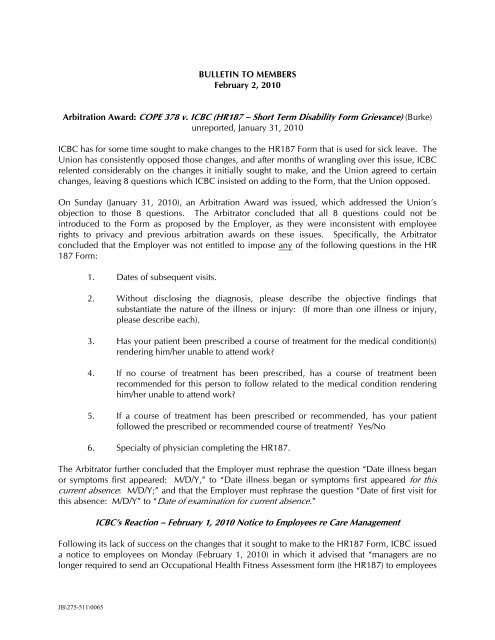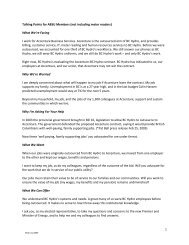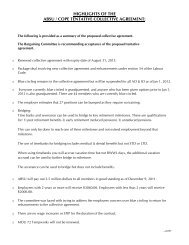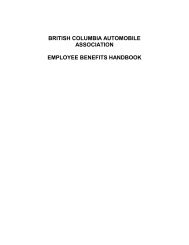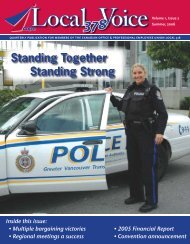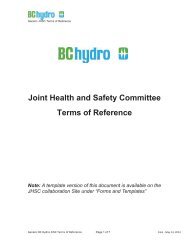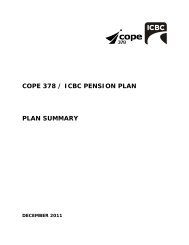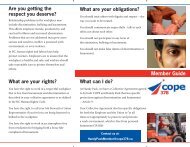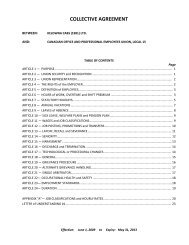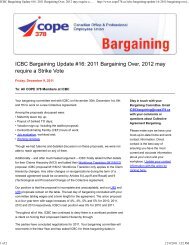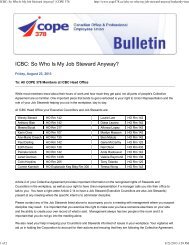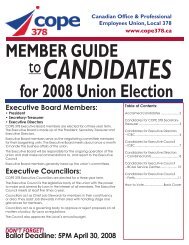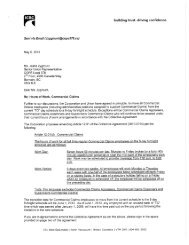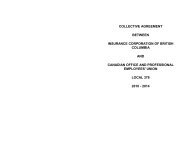Arbitration Award: COPE 378 v. ICBC (HR187 â Short Term ...
Arbitration Award: COPE 378 v. ICBC (HR187 â Short Term ...
Arbitration Award: COPE 378 v. ICBC (HR187 â Short Term ...
Create successful ePaper yourself
Turn your PDF publications into a flip-book with our unique Google optimized e-Paper software.
BULLETIN TO MEMBERS<br />
February 2, 2010<br />
<strong>Arbitration</strong> <strong>Award</strong>: <strong>COPE</strong> <strong>378</strong> v. <strong>ICBC</strong> (<strong>HR187</strong> – <strong>Short</strong> <strong>Term</strong> Disability Form Grievance) (Burke)<br />
unreported, January 31, 2010<br />
<strong>ICBC</strong> has for some time sought to make changes to the <strong>HR187</strong> Form that is used for sick leave. The<br />
Union has consistently opposed those changes, and after months of wrangling over this issue, <strong>ICBC</strong><br />
relented considerably on the changes it initially sought to make, and the Union agreed to certain<br />
changes, leaving 8 questions which <strong>ICBC</strong> insisted on adding to the Form, that the Union opposed.<br />
On Sunday (January 31, 2010), an <strong>Arbitration</strong> <strong>Award</strong> was issued, which addressed the Union’s<br />
objection to those 8 questions. The Arbitrator concluded that all 8 questions could not be<br />
introduced to the Form as proposed by the Employer, as they were inconsistent with employee<br />
rights to privacy and previous arbitration awards on these issues. Specifically, the Arbitrator<br />
concluded that the Employer was not entitled to impose any of the following questions in the HR<br />
187 Form:<br />
1. Dates of subsequent visits.<br />
2. Without disclosing the diagnosis, please describe the objective findings that<br />
substantiate the nature of the illness or injury: (If more than one illness or injury,<br />
please describe each).<br />
3. Has your patient been prescribed a course of treatment for the medical condition(s)<br />
rendering him/her unable to attend work?<br />
4. If no course of treatment has been prescribed, has a course of treatment been<br />
recommended for this person to follow related to the medical condition rendering<br />
him/her unable to attend work?<br />
5. If a course of treatment has been prescribed or recommended, has your patient<br />
followed the prescribed or recommended course of treatment? Yes/No<br />
6. Specialty of physician completing the <strong>HR187</strong>.<br />
The Arbitrator further concluded that the Employer must rephrase the question “Date illness began<br />
or symptoms first appeared: M/D/Y,” to “Date illness began or symptoms first appeared for this<br />
current absence: M/D/Y;” and that the Employer must rephrase the question “Date of first visit for<br />
this absence: M/D/Y” to “Date of examination for current absence.”<br />
<strong>ICBC</strong>’s Reaction – February 1, 2010 Notice to Employees re Care Management<br />
Following its lack of success on the changes that it sought to make to the <strong>HR187</strong> Form, <strong>ICBC</strong> issued<br />
a notice to employees on Monday (February 1, 2010) in which it advised that “managers are no<br />
longer required to send an Occupational Health Fitness Assessment form (the <strong>HR187</strong>) to employees<br />
JB\275-511\0065
who are absent on sick leave” and that instead, the Employer will have its “Return to Work team”<br />
contact employees on sick leave.<br />
The Union is very concerned that the Employer may be attempting to evade the restrictions placed<br />
on it by the <strong>Arbitration</strong> <strong>Award</strong>. In bypassing the <strong>HR187</strong> Form, and contacting employees directly<br />
as proposed, <strong>ICBC</strong> may seek to elicit the type of information that it was prohibited from seeking<br />
under the <strong>Arbitration</strong> <strong>Award</strong>. By posing its inquiries verbally rather than committing them to<br />
writing, the Employer makes it difficult, if not impossible, for the Union to ascertain what inquiries<br />
are being made of its members, and to hold the Employer accountable for those inquiries.<br />
The Employer states in its notice to employees that its new process will: “allow the Return to Work<br />
team to provide assistance to employees in obtaining referrals to specialists for assessments or<br />
treatments, and to arrange for assistive devices.” The Employer advanced the same reasoning in<br />
seeking to impose its changes to the <strong>HR187</strong> Form. The Arbitrator found that the Employer’s interest<br />
in wellness initiatives to prevent illness, to assist employees in maintaining good health and<br />
returning to work earlier, do not override employees’ legal rights to privacy regarding their medical<br />
information (<strong>Award</strong>, pp. 27-28). We are aware of no circumstance in which <strong>ICBC</strong> has provided<br />
assistance to an employee in obtaining referrals to specialists for treatment; and it is the Union’s<br />
position that the <strong>HR187</strong> Form gives the Employer ample information to arrange for return to work<br />
and accommodation. If an employee requires an assistive device, the employee’s physician is able<br />
to express that in the comments portion of the <strong>HR187</strong> Form, or the employee may simply ask for it.<br />
The Employer’s proposal to contact employees directly with interrogatory phone calls regarding<br />
their medical information is very troubling. In particular, the Union is deeply concerned with the<br />
Employer’s stated intention that “the Return to Work team will also be able to work more closely<br />
with the employee’s own medical team in preparing for return to work.” This Employer<br />
interference with the patient-physician relationship and an employee’s treatment is precisely the<br />
type of intrusion that the Union has consistently sought to prevent.<br />
What Can You Do<br />
If <strong>ICBC</strong> contacts you while you are off sick, we recommend that you:<br />
1. Let the caller know when you will return to work;<br />
2. Ask the caller to put any questions they may have in writing, or ask the caller to list<br />
the questions for you, so that you can write them down; and advise that you will<br />
respond once you have spoken to your Union;<br />
3. Take the name and position title of the caller; and<br />
4. Call the Union right away to review the questions posed, <strong>COPE</strong>, Local <strong>378</strong> (604-<br />
299-0<strong>378</strong>).<br />
Your input will allow us monitor this carefully.<br />
David Black<br />
<strong>COPE</strong> <strong>378</strong> Vice President<br />
JB\275-511\0065
Jaime Zygmunt<br />
Senior Union Representative<br />
JB\275-511\0065


